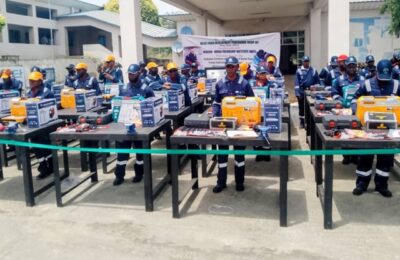By Musa Bakare.
Since taking oath of office in May 2023, President Bola Ahmed Tinubu, GCFR, has led Nigeria through a period of deep and determined reform. His administration has initiated bold policy changes designed to reposition the country’s economic landscape, strengthen national institutions, and restore confidence in governance.
Despite unfair criticisms from opposition coalitionists, the results of his reformist leadership are beginning to resonate across various sectors.
One of the most noticeable impacts is the increase in monthly federal allocations to states. This policy shift has empowered some state governors to launch transformative infrastructure and social development projects. The enhanced financial capacity at the sub national level is paving the way for more inclusive growth and stability across the federation.
A defining reform under President Tinubu’s administration is the removal of fuel subsidy a necessary step that has significantly reduced the avenues for corruption in the oil sector. Funds previously lost to the opaque subsidy system are now being redirected into critical national projects and social investments. Measures to stabilize fuel prices have also been introduced to cushion the effect on citizens and encourage long-term economic adjustment.
In the financial sector, the administration has taken proactive steps to tackle Nigeria’s longstanding foreign exchange challenges. New initiatives aimed at improving forex access for traders and businesses are helping to ease operational bottlenecks and strengthen Nigeria’s global trade position.
The tax system is undergoing strategic reform to broaden the revenue base and promote compliance through technology-driven platforms. These efforts are not only boosting government revenue but also funding infrastructure upgrades and poverty reduction initiatives.
Security, a top national concern, is receiving renewed attention under President Tinubu’s leadership. Increased budgetary support for the military and police is being complemented by community based strategies that address the root causes of crime, including unemployment, extremism, and social exclusion.
In the education sector, a groundbreaking student loan program, including a ₦45,000 monthly stipend for students in technical institutions, has been launched.
This initiative reflects the administration’s commitment to equipping Nigerian youth with practical skills aligned with the demands of the 21st-century workforce.
Ongoing reforms in vocational and higher education are being structured in partnership with the private sector to drive job creation and innovation.
Significant investments in transportation and energy infrastructure are also underway. Improved road networks, rail services, and expanded electricity projects are expected to ease the cost of doing business and elevate the standard of living for millions of Nigerians.
President Tinubu’s administration has also demonstrated sensitivity to citizens’ everyday challenges, with notable improvements in passport processing and the resolution of prolonged disruptions in the academic calendar.
These actions reflect a responsive governance style focused on delivering measurable results.
As the nation journeys toward 2031 and beyond with President Tinubu, his reform agenda is laying the foundation for a more resilient and globally competitive Nigeria.
Asiwaju Bola Ahmed Tinubu’s leadership, defined by bold, courageous decision making and strategic vision, steering the country toward a future of sustainable prosperity.
Musa Asiru Bakare, a Foundation Member of All Progressives Congress (APC); Member, Tinubu Support Group (TSG); Political Analyst, writes from Lokoja, Kogi State.




